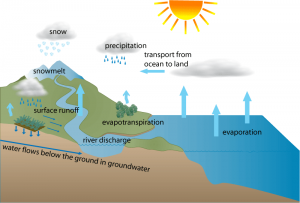My Changes and the Problem at Large
Water is consumed everywhere at college. We take showers, sometimes twice in a day. We drink gallons and gallons of water, and do loads upon loads of laundry. The food that we eat is cooked with water, and the plates and dishes that we eat off of are cleaned with water. Clearly, water consumption is instrumental in life. At the college level, when we are not directly paying for the water that we shower under or the water that cleans our clothes, are concern for water consumption might not be as high as it should be.
However, the impacts of water consumption are nonetheless large. The 50+ gallons of water that are used in a washing machine cycle eventually leave the machine through a pipe system. The water is contaminated with soluble detergent chemicals and dirt from the clothing. The water is then pumped to a sewage treatment plant where it is processed (in a high-energy environment) and re-distributed to the Delaware River. Hundreds and hundreds of cycles of laundry are done in the McKeen laundry room (where I do my laundry on campus) in a given week, and some of this water is consumed by the process and not directly returned to the water cycle. Changing my laundry habits have helped reduce the water consumed and wasted through the laundry process. However, I am only one student out of 2500 at Lafayette who all practice the same sort of laundry schedule.
In reading the posts of other students trying to limit their water or laundry consumption, I realize that to an extent we are experiencing the same problems and realizations. It was brought up that some changes might not be as effective as we perceived them to be, especially once we start the behavior change. For example, a student noted that brushing teeth while showering was probably wasting more water than it was saving. For me, compacting my laundry into one single load per week may reduce the water used for cleaning, but the clothes don’t come out as clean, and stains remain more permanent. At times, I had to cave and undertake a second load of laundry, with hot water to help remove stains in khaki pants. While this may not be an efficient use of water, we have all learned that making changes are difficult to stick too, especially when convenience and personal (direct) benefit is hindered.
I think it is smart that we divided the posts into communities, so that we can all see how other students are changing their daily behaviors to help reduce environmental impact (even if the impact is minimal). The point of the activity seems to be more about realizing what an eco-friendly lifestyle would be like if everyone practiced in, rather than trying to reduce environmental impact in a semester. Having a community to base my thoughts and behaviors off of helped me realize that I was going through the same struggles as other people, even though we were making different changes to our lives.

Leave a Reply